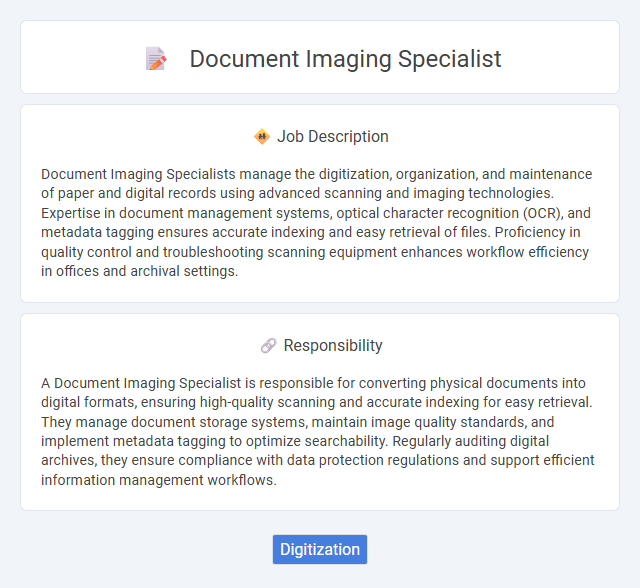
Document Imaging Specialists manage the digitization, organization, and maintenance of paper and digital records using advanced scanning and imaging technologies. Expertise in document management systems, optical character recognition (OCR), and metadata tagging ensures accurate indexing and easy retrieval of files. Proficiency in quality control and troubleshooting scanning equipment enhances workflow efficiency in offices and archival settings.
Individuals who are detail-oriented and comfortable working with digital technology are likely suitable for a Document Imaging Specialist role. Those who prefer repetitive tasks and have good organizational skills probably find this job fitting, as it often involves scanning, indexing, and managing large volumes of documents. People who struggle with prolonged concentration or dislike clerical work may have difficulty adapting to the demands of this position.
Qualification
A Document Imaging Specialist must possess expertise in document management systems, including proficiency with scanning technologies, OCR software, and digital archiving solutions. Strong attention to detail, organizational skills, and knowledge of data security protocols are critical for managing sensitive information accurately and securely. Experience with electronic document workflows and familiarity with industry standards for document retention and compliance further enhance a candidate's qualifications in this role.
Responsibility
A Document Imaging Specialist is responsible for converting physical documents into digital formats, ensuring high-quality scanning and accurate indexing for easy retrieval. They manage document storage systems, maintain image quality standards, and implement metadata tagging to optimize searchability. Regularly auditing digital archives, they ensure compliance with data protection regulations and support efficient information management workflows.
Benefit
Document Imaging Specialists might improve organizational efficiency by digitizing paper records, which can lead to faster information retrieval and reduced physical storage needs. Their expertise could enhance data security, minimizing the risk of document loss or unauthorized access. These benefits may result in cost savings and streamlined workflows for businesses.
Challenge
A Document Imaging Specialist likely faces the challenge of managing large volumes of diverse documents while ensuring accurate digital conversion and organization. The role may require troubleshooting technical issues with scanning hardware or software, which demands a high level of technical proficiency and problem-solving skills. Maintaining data security and compliance with industry regulations probably adds an additional layer of complexity to the position.
Career Advancement
A Document Imaging Specialist plays a crucial role in managing and digitizing business documents using advanced scanning technologies and document management systems. Mastery of OCR software, metadata tagging, and workflow automation can significantly enhance career prospects. Progression opportunities include roles such as Document Control Manager or Records Management Supervisor, often accompanied by certifications in information governance or digital archiving.
Key Terms
Digitization
Document Imaging Specialists play a crucial role in the digitization of paper-based records, converting physical documents into high-quality digital formats using advanced scanning and imaging technologies. Expertise in optical character recognition (OCR) software and metadata tagging ensures efficient indexing and retrieval within digital content management systems. This specialization supports enhanced data accessibility, compliance with regulatory standards, and streamlines workflow automation across various industries.
 kuljobs.com
kuljobs.com